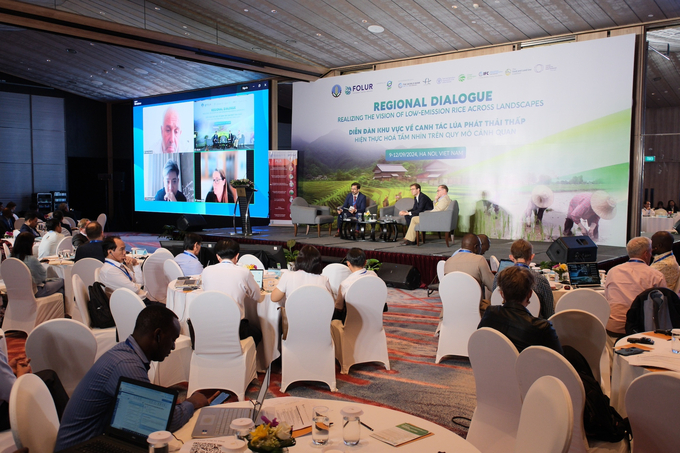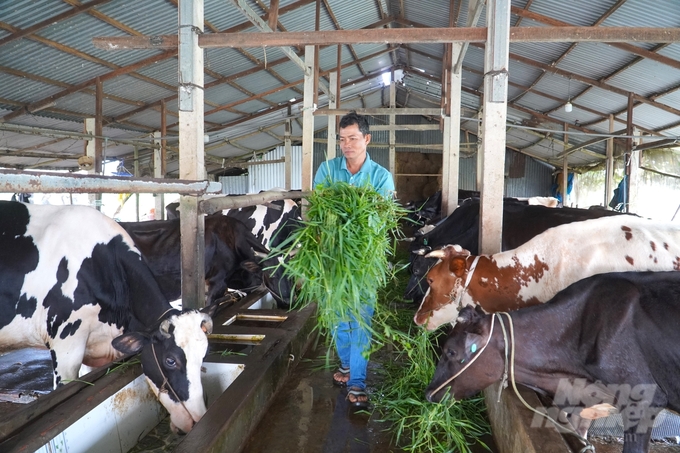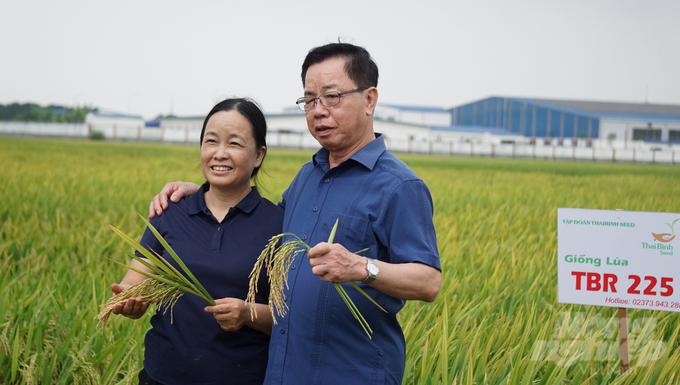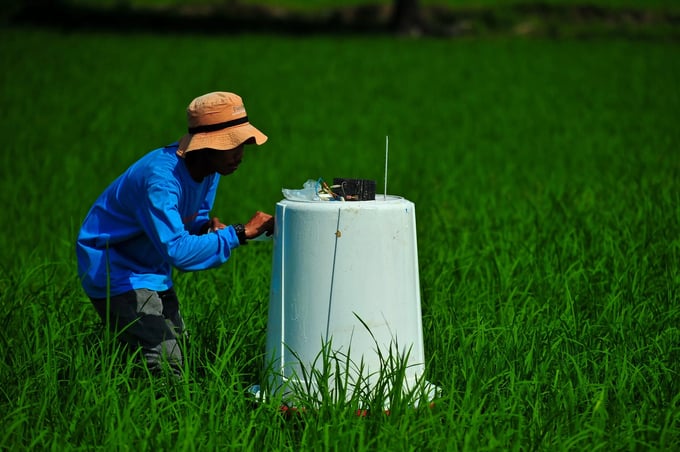May 27, 2025 | 22:16 GMT +7
May 27, 2025 | 22:16 GMT +7
Hotline: 0913.378.918
May 27, 2025 | 22:16 GMT +7
Hotline: 0913.378.918

Regional forum “Realizing the vision of low-emission rice across landscapes” on September 10. Photo: Quynh Chi.
On September 10, the second session of the regional forum “Realizing the vision of low-emission rice across landscapes” co-organized by the Ministry of Agriculture and Rural Development and the World Bank (WB), took place. The session featured discussions on financial incentives and technical support for farmers engaged in low-emission rice cultivation.
Need to increase investment 18 times to reduce emissions in agriculture
World Bank expert Alexander Lotsch introduced concepts from the climate finance system, highlighting that mitigation finance covers costs that support efforts to reduce emissions or sequester greenhouse gases.
In 2023, the World Bank updated its list of activities eligible for climate mitigation finance. In agricultural production, emission reduction activities include reducing fertilizer use, collecting and processing agricultural by-products and waste, adopting farming methods that increase soil carbon content, restoring degraded soils, and implementing efficient irrigation processes.
The World Bank report indicates that investments in food production and environmental protection are not competitive but complementary. By reducing emissions and promoting sustainable livelihoods, the global agricultural sector can achieve greater productivity and resilience.
Increasing the involvement of farmers and the public-private sector in climate change mitigation finance is essential to strengthening the global climate mitigation system. However, currently, only 2% of mitigation finance is allocated to the agricultural sector. To meet emissions reduction targets by 2030, climate finance for agriculture must increase 18-fold, reaching an annual investment of $260 billion.

The agricultural sector emits about one-third of the world's total greenhouse gas emissions. Photo: Kim Anh .
Lotsch emphasized that the global food system is caught in a “vicious cycle." Population growth drives increased demand for food, while agricultural production, processing, and trade are major sources of greenhouse gas emissions. According to World Bank data, the agricultural sector is responsible for approximately 16 gigatons of CO2 emissions annually, about one-third of total global greenhouse gas emissions.
Increased demand for food leads to increased emissions. Global warming due to greenhouse gas emissions reduces agricultural productivity, making it difficult for farmers to cultivate. It is inevitable that farmers will trade off sustainability to quickly increase production.
ThaiBinh Seed shares experience in cooperating with farmers
Speaking to more than 100 international delegates from Southeast Asian and African countries, Ms. Tran Thi Tiep, Deputy Director of the Crop Research Institute of ThaiBinh Seed Group, highlighted the company’s commitment to building sustainable cooperative relationships with local cooperatives.
Specifically, ThaiBinh Seed collaborates with agricultural service cooperatives to plan production areas, select suitable varieties, and determine cultivation zones. By jointly planning production, farmers and businesses ensure transparency and efficiency for both parties.
After finalizing the production linkage contract, ThaiBinh Seed continues to support farmers by organizing training courses on sustainable farming practices, equipping them with modern techniques to reduce greenhouse gas emissions.
Notably, ThaiBinh Seed’s rice production process is designed to not only boost productivity but also minimize environmental impact. The technical package includes straw treatment, proper fertilization, optimized seeding rates, and effective irrigation methods.
According to the Crop Research Institute of ThaiBinh Seed Group, this technology package significantly benefits farmers by reducing labor, saving on input costs, and increasing rice yields by 12% to 33.66% compared to traditional methods.
For example, farmers now only need to fertilize twice per crop cycle, compared to the previous four times, which saves 30% on fertilizer usage and costs. Tightening water use to three applications per crop reduces irrigation needs, strengthens rice plants, limits pest and disease occurrences, and enhances the crop’s resistance to lodging.

ThaiBinh Seed Group is committed to accompanying farmers from production to harvesting and market access. Photo: Tran Quoc Toan.
Furthermore, by managing water levels according to the growth stages of rice plants, CO2 emissions are reduced by 0.34 to 1.31 tons of CO2 per hectare.
Deputy Director Tran Thi Tiep shared with the international community that to further support farmers, ThaiBinh Seed commits to purchasing products at prices 10% to 25% higher than the market rate, depending on the product type. The specific prices are clearly stated in the previously signed contracts.
Payments are made through cooperatives within 15 days after importing seeds, either by bank transfer to the cooperative or directly to farmers upon request.
Ms. Tiep affirmed that ThaiBinh Seed is committed to supporting farmers in transitioning towards modern and sustainable farming methods. The company closely monitors the entire production process – from inspecting and evaluating rice during growth stages to tracking yield and harvesting – to ensure that the quality of the final product meets the committed standards. This approach aims to create a healthy business environment and reduce economic pressure, enabling farmers to confidently adopt emission-reducing farming practices.
Farmers are reliable borrowers
At the forum, fin-tech platform Agritech highlighted the importance of supporting smallholder farmers across Asia. CEO David Chen emphasized the need to encourage farmers to cultivate sustainably, transform their livelihoods towards sustainability, and adapt to climate change.
To this end, AgriG8 is focused on mobilizing green finance funds to promote sustainable farming practices while also enhancing farmers' capacity to adapt to the challenges posed by climate change.
AgriG8 improves farmers’ access to finance based on the belief that those who adopt sustainable practices are more resilient and therefore more reliable borrowers. With AgriG8's investment acting as a catalyst, farmers will become less dependent on government and private funding, and instead, proactively shift towards market-based mechanisms.

Scientists need to work with farmers to ensure a smooth transition when adopting new techniques. Photo: CarbonFarm.
Additionally, Mr. Vassily Carantino, CEO of CarbonFarm, noted that many farmers have already begun transitioning towards sustainability, creating a natural opportunity to further advance these efforts. However, measuring, reporting, and verifying (MRV) these sustainable practices remains a significant challenge due to complex standards and stringent requirements for consistency.
CarbonFarm therefore underscores the importance of applying technology on large-scale fields, with scientists collaborating closely with farmers to ensure a smooth transition when implementing new techniques. Such a mechanism will help establish a “self-financial” model, facilitating the global expansion of climate-adapted rice production.
/2025/05/25/4127-3-073637_820.jpg)
(VAN) Thanks to the promotion from an FAO-implemented project, vegetable production in greenhouses in Moc Chau has seen strong development, from 1.5 hectares in 2021 to nearly 50 hectares in 2024.

(VAN) FAO has recently supported USD 140,000 to implement the project 'Risk mitigation human-animal interface risks through disease control initiatives in pig farming.'

(VAN) The People's Committee of Tra Vinh province has approved an adjustment to the investment policy for the Green Hydrogen Plant project, increasing its area to approximately 52.76 hectares.
![Reducing emissions from rice fields: [2] Farmers’ commitment to the soil](https://t.ex-cdn.com/nongnghiepmoitruong.vn/608w/files/news/2025/05/05/dsc08881jpg-nongnghiep-140632.jpg)
(VAN) Clean rice cultivation model in Thuong Tan commune, Bac Tan Uyen district, is assisting local residents in achieving sustainable agriculture by substantially reducing costs, increasing productivity, and protecting the environment.

(VAN) At the conference to disseminate Resolution No. 68, AgriS introduced its digital agricultural ecosystem and reaffirmed its commitment to accompanying the Government in promoting private sector development and sustainable agriculture.

(VAN) 'Blue Ocean - Blue Foods' initiative is designed to restore marine ecosystems and establish sustainable livelihoods for local communities by cultivating a minimum of 1,000 hectares of cottonii seaweed in the first three years.
/2025/05/21/4642-3-112707_603.jpg)
(VAN) The V-SCOPE project has made direct contributions to three out of six pillars of the Comprehensive Strategic Partnership between Vietnam and Australia.